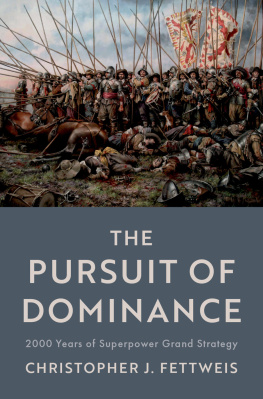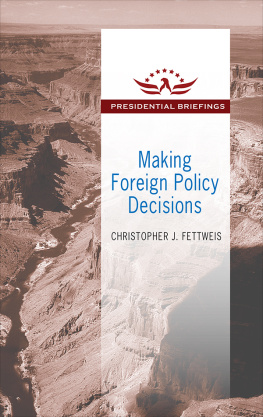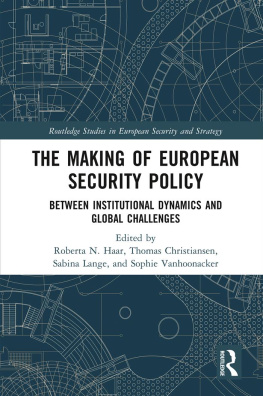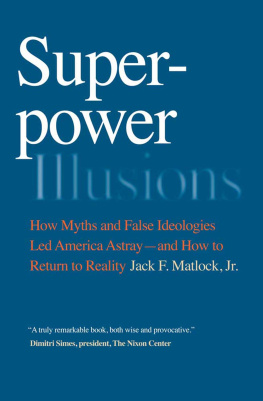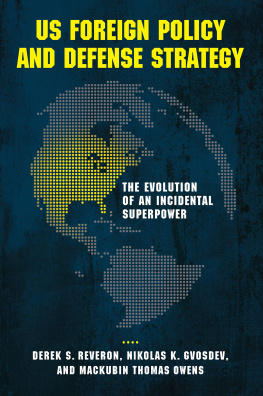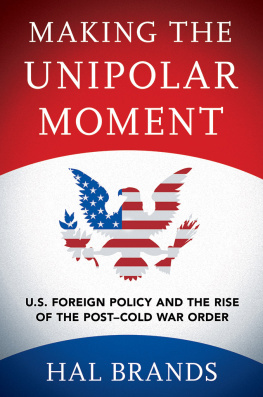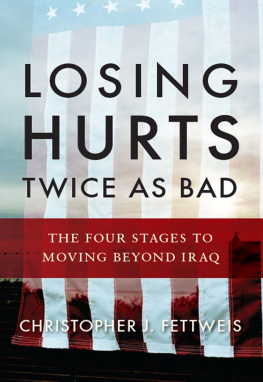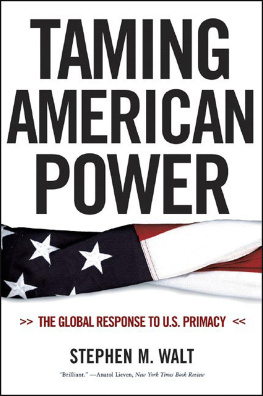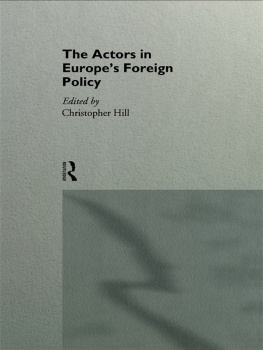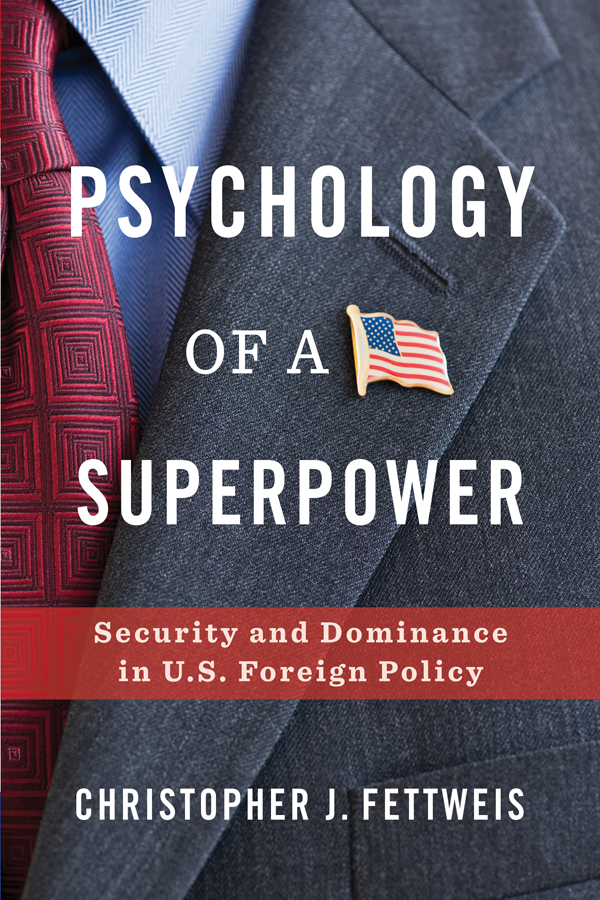Contents
Guide
Pagebreaks of the print version
PSYCHOLOGY OF A SUPERPOWER
PSYCHOLOGY OF A SUPERPOWER
SECURITY AND DOMINANCE
in
U.S. FOREIGN POLICY

CHRISTOPHER J. FETTWEIS
Columbia University Press
New York

Columbia University Press
Publishers Since 1893
New York Chichester, West Sussex
cup.columbia.edu
Copyright 2018 Columbia University Press
All rights reserved
E-ISBN 978-0-231-54741-3
Library of Congress Cataloging-in-Publication Data
Names: Fettweis, Christopher J.
Title: Psychology of a superpower : security and dominance in U.S. foreign policy / Christopher J. Fettweis.
Description: New York : Columbia University Press, 2018. | Includes bibliographical references and index.
Identifiers: LCCN 2017048101 (print) | LCCN 2018000747 (ebook) | ISBN 9780231187701 (cloth : alk. paper) | ISBN 9780231187718 (pbk. : alk. paper)
Subjects: LCSH: United StatesForeign relations. | United StatesForeign relationsPsychological aspects. | United StatesForeign relationsDecision making. | Unipolarity (International relations)
Classification: LCC JZ1480 (ebook) | LCC JZ1480 .F52 2018 (print) | DDC 327.73dc23
LC record available at https://lccn.loc.gov/2017048101
A Columbia University Press E-book.
CUP would be pleased to hear about your reading experience with this e-book at .
Cover Design: : Noah Arlow
CONTENTS
I n 2016, Donald Trump accomplished what many would have previously thought impossible: He united the disparate, ever-quarrelsome foreign-policy community. From hawkish neoconservatives to the most ardent of isolationists and everyone in between, elite opinion was aghast at the prospect of such an inexperienced, temperamental, controversial commander in chief. The number of Trump supporters among the national-security elite could be counted on one hand, even by a shop teacher. But the masses did not agree, or at least enough did not in key states, and the unthinkable followed. For the first time in anyones memory, the rational-actor assumption is about to be put to a severe test.
However, despite the apparent global chaos and geopolitical uncertainty, the structural forces of international relations are fairly stable and will not be much affected by the new presidents choices. Most of all, the relative power of the United States during the Trump years will not change drastically from what he inherited. The steady stream of analyses lamenting the coming loss of U.S. leadership largely mistakes emotion for fact and pessimism for empiricism. The United States is going to remain the strongest country in the world for some time to come. What it chooses to do with that power is, of course, hardly predetermined, and that is the subject of this book.
Trumps America will test many theories of political science, and those in this book are no exception. If his policies do not inspire balancing behavior, for example, what will? If the world remains relatively peacefulwhich it is, by nearly any measurewhen he leaves office, what would cause war to return? We will know more about the fundamental nature of the twenty-first-century system when the Trump clouds clear, for better or worse.
This work draws heavily upon insights from psychology, and I have benefited enormously from the generous assistance of a number of scholars in that field. Those who helped me understand the findings of their profession, pointed me toward the best sources, and corrected my misunderstandings include Art Markman, Michael Kraus, and Carrie Wyland. Anything in these pages that stands uncorrected is obviously my fault alone.
Inchoate versions of some of the arguments to come have appeared in Security Studies , Comparative Strategy , and Survival . What is included here is much updated and, one hopes, improved.
I n late 1987, as the Soviet Union was beginning its long, slow circle around the drain, Georgi Arbatov issued a dire warning to the United States. In a letter to the New York Times , Arbatov, one of the Kremlins leading Amerikanists, wrote that the Soviets were unleashing a secret weapon, one that will work almost regardless of the American response. It was not the stuff of Cold War nightmares, a last-minute technological deus ex machina from the Academy of Sciences, that would rescue the USSR from oblivion. No, in this instance the weapon was psychological and unequivocal: the Kremlin was going to deprive America of The Enemy. The event for which generations of U.S. policy makers had worked, prayed, and bledthe implosion of the Soviet Unionwas about to occur, and it was going to create unforeseen problems for the United States.
By the end of 1991, even those skeptical of Gorbachev and suspicious of Soviet intentions had to admit that the world was entering an entirely new phase. When the coup by hardliners not only failed but led to the dissolution of the empire, the greatest enemy in the history of the United Statesand the raison detre of its security communityvanished without a fight. The Wests bloodless victory appeared to be the best of all possible outcomes, especially when compared to the rather grim list of alternatives. But it did not come without cost, and forging a new order has not proven easy.
The world left in the wake of that collapse had precedent in neither modern nor ancient history. Regional hegemons had existed many times before, but never had one country been able to exert such drastic dominance over any potential competitor in all traditional measures of power. For the first time, the international system contained one member that, while hardly omnipotent, had precious few constraints on its ability to act. The world had become unipolar .
A great deal has been written on the meaning of unipolarity as scholars and policy makers alike struggled to understand the implications of the new, confusing, confounding phase they had entered. Indeed, one might be forgiven for wondering why the world needs yet another work on the subject. Fortunately, such concerns have never stopped anyone before; academic markets rarely reach saturation points. And there are many important questions that remain essentially unanswered, even twenty-five years after the Soviet collapse, while others are still controversial or underexplored.
This is a book about the current world order. It examines a series of structural, strategic, and psychological aspects of unipolarity and speculates not just about the centers effect on the system but also about the other way around: What has the rather sudden realization that it stands alone atop the international hierarchy done to the United States? How has unipolarity affected the way U.S. leaders conceive of their role, make strategy, or perceive others? No one would expect an individual to become the richest, most powerful person in the world without experiencing profound psychological and behavioral consequences. Power corrupts, as everyone knows. The effects of unbalanced, unchecked capabilities on the individual are familiar and relatively uncontroversial; what are its effects on states?
UNIPOLARITY: WHAT WE KNOW, WHAT WE DONT
System structure is a concept close to the heart of those who study international relations. Scholars have spent more than fifty years debating the relative merits of various power configurations, particularly those of multipolar and bipolar systems, since for quite some time unipolarity appeared profoundly unlikely.


